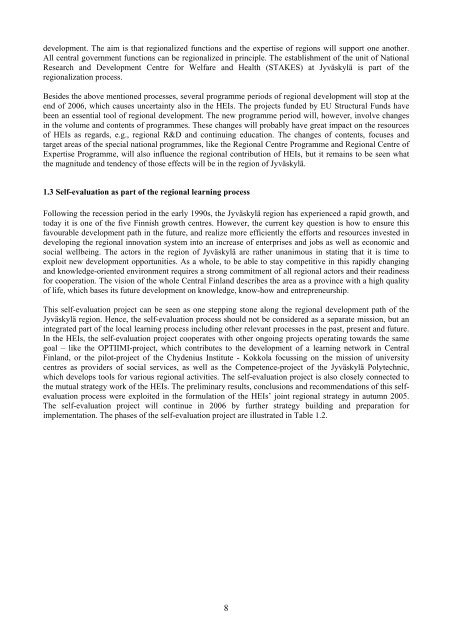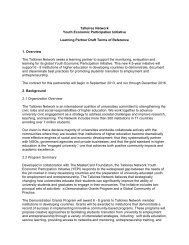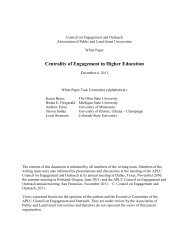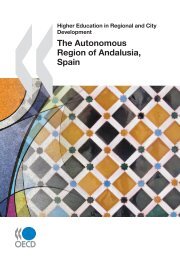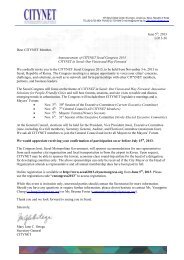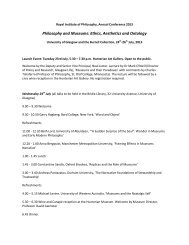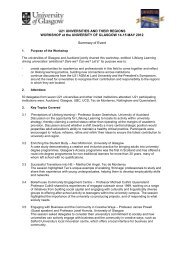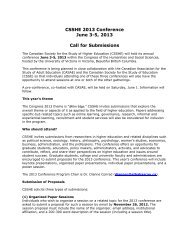Finland - Jyvaskyla Region - Final Self-Evaluation Report.pdf
Finland - Jyvaskyla Region - Final Self-Evaluation Report.pdf
Finland - Jyvaskyla Region - Final Self-Evaluation Report.pdf
You also want an ePaper? Increase the reach of your titles
YUMPU automatically turns print PDFs into web optimized ePapers that Google loves.
development. The aim is that regionalized functions and the expertise of regions will support one another.All central government functions can be regionalized in principle. The establishment of the unit of NationalResearch and Development Centre for Welfare and Health (STAKES) at Jyväskylä is part of theregionalization process.Besides the above mentioned processes, several programme periods of regional development will stop at theend of 2006, which causes uncertainty also in the HEIs. The projects funded by EU Structural Funds havebeen an essential tool of regional development. The new programme period will, however, involve changesin the volume and contents of programmes. These changes will probably have great impact on the resourcesof HEIs as regards, e.g., regional R&D and continuing education. The changes of contents, focuses andtarget areas of the special national programmes, like the <strong>Region</strong>al Centre Programme and <strong>Region</strong>al Centre ofExpertise Programme, will also influence the regional contribution of HEIs, but it remains to be seen whatthe magnitude and tendency of those effects will be in the region of Jyväskylä.1.3 <strong>Self</strong>-evaluation as part of the regional learning processFollowing the recession period in the early 1990s, the Jyväskylä region has experienced a rapid growth, andtoday it is one of the five Finnish growth centres. However, the current key question is how to ensure thisfavourable development path in the future, and realize more efficiently the efforts and resources invested indeveloping the regional innovation system into an increase of enterprises and jobs as well as economic andsocial wellbeing. The actors in the region of Jyväskylä are rather unanimous in stating that it is time toexploit new development opportunities. As a whole, to be able to stay competitive in this rapidly changingand knowledge-oriented environment requires a strong commitment of all regional actors and their readinessfor cooperation. The vision of the whole Central <strong>Finland</strong> describes the area as a province with a high qualityof life, which bases its future development on knowledge, know-how and entrepreneurship.This self-evaluation project can be seen as one stepping stone along the regional development path of theJyväskylä region. Hence, the self-evaluation process should not be considered as a separate mission, but anintegrated part of the local learning process including other relevant processes in the past, present and future.In the HEIs, the self-evaluation project cooperates with other ongoing projects operating towards the samegoal – like the OPTIIMI-project, which contributes to the development of a learning network in Central<strong>Finland</strong>, or the pilot-project of the Chydenius Institute - Kokkola focussing on the mission of universitycentres as providers of social services, as well as the Competence-project of the Jyväskylä Polytechnic,which develops tools for various regional activities. The self-evaluation project is also closely connected tothe mutual strategy work of the HEIs. The preliminary results, conclusions and recommendations of this selfevaluationprocess were exploited in the formulation of the HEIs’ joint regional strategy in autumn 2005.The self-evaluation project will continue in 2006 by further strategy building and preparation forimplementation. The phases of the self-evaluation project are illustrated in Table 1.2.8


